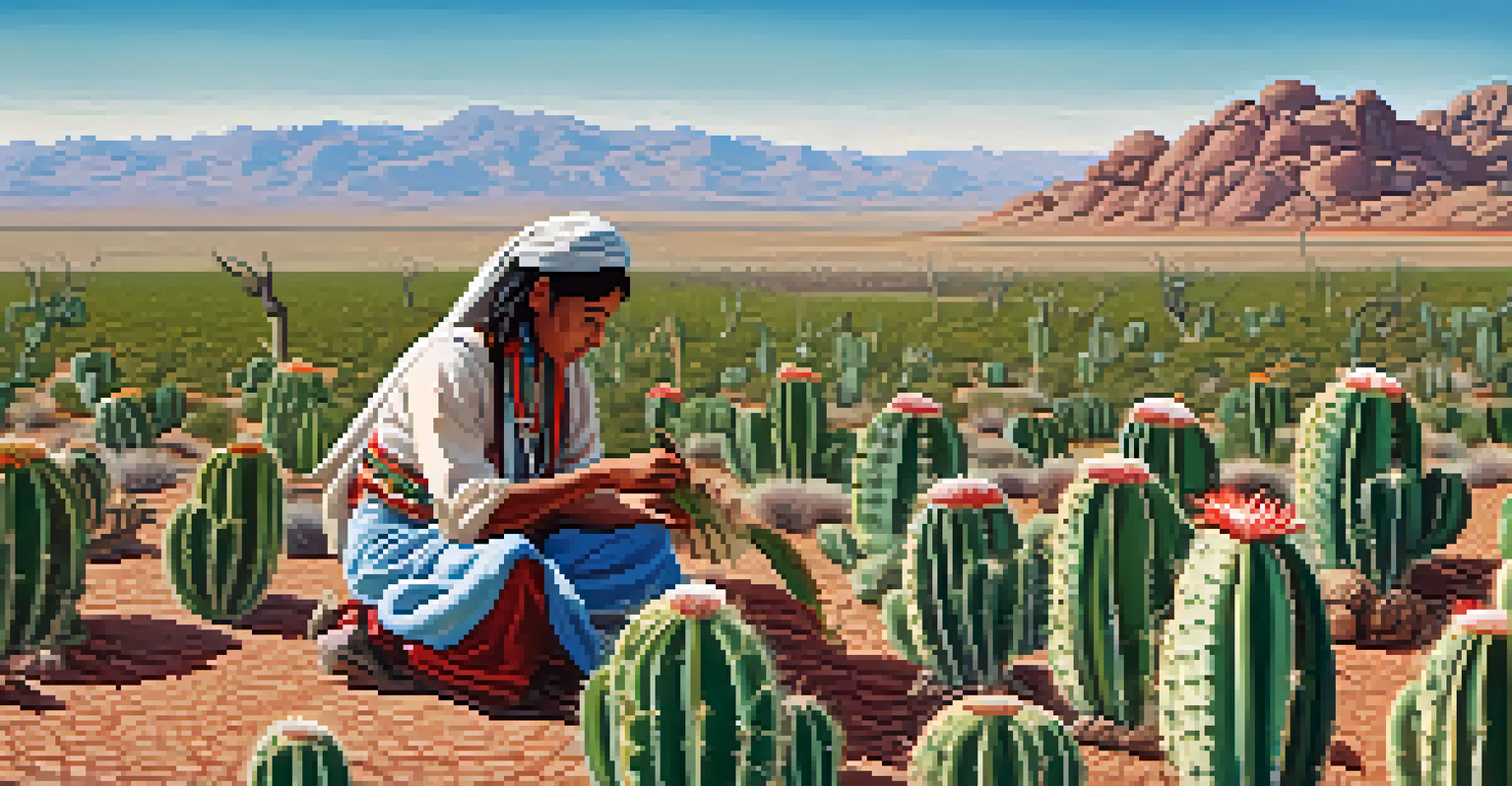The Role of Peyote in Indigenous Cultures: An Ethical Lens

Understanding Peyote: A Sacred Plant for Indigenous Peoples
Peyote, a small cactus native to North America, holds deep spiritual significance for many Indigenous cultures. This plant is not just a botanical specimen; it's a revered entity that plays a crucial role in various ceremonial practices. For tribes like the Huichol and the Native American Church, Peyote represents a connection to the divine and the natural world.
We must protect the forests for our children, grandchildren, and children yet to be born. We must protect the forests for those who can't speak for themselves, such as the animals and the birds.
Traditionally, Peyote has been used in rituals to facilitate healing, guidance, and spiritual enlightenment. These gatherings often involve communal experiences where participants consume the cactus to enter altered states of consciousness, fostering a sense of unity and shared understanding among practitioners. This sacred use contrasts sharply with how Peyote is often portrayed in popular culture.
Understanding the cultural context of Peyote emphasizes its role beyond mere substance. It embodies a worldview that prioritizes respect for nature, community, and spirituality, which are essential elements of Indigenous identity. This perspective invites a deeper appreciation for Peyote and the traditions surrounding it.
Historical Context: Peyote and Indigenous Resilience
The use of Peyote dates back thousands of years, intertwined with the history of Indigenous peoples in North America. Despite colonial pressures, Indigenous communities have maintained their traditions, including Peyote rituals, as acts of resilience and resistance. This historical backdrop highlights the enduring connection between the plant and Indigenous identity.

As Indigenous peoples faced displacement and cultural suppression, Peyote ceremonies became a means to preserve their heritage and spiritual beliefs. These practices served not only as a form of resistance but also as a way to foster community bonds amidst adversity. By engaging with Peyote, tribes reaffirm their spiritual autonomy and cultural continuity.
Peyote's Cultural Significance
Peyote serves as a sacred plant deeply embedded in Indigenous spiritual practices, symbolizing a profound connection to nature and community.
Today, recognizing this historical context is essential for understanding the contemporary significance of Peyote. It is not merely a substance to be regulated or exploited; it symbolizes a profound legacy of survival and strength. This perspective shifts the conversation toward honoring Indigenous practices and their rightful place within the broader cultural landscape.
Peyote in Modern Indigenous Practices and Spirituality
In contemporary times, Peyote continues to play an integral role in the spiritual lives of many Indigenous peoples. It is often incorporated into healing ceremonies, sweat lodges, and other sacred gatherings that aim to bring about personal and communal healing. These practices are a testament to the adaptability of Indigenous spirituality in the face of changing circumstances.
The land is sacred. It is not ours. It is a gift from our ancestors, and it is our duty to protect it.
Modern-day practitioners emphasize the importance of intention and respect when using Peyote. The ceremonial context is crucial, as it transforms the act of consumption into a spiritual journey rather than a recreational experience. This mindful approach underscores the deep reverence that accompanies Peyote use, distinguishing it from other uses that may lack cultural significance.
Furthermore, the resurgence of interest in Indigenous spirituality has led to increased visibility for Peyote ceremonies. This growing acknowledgment calls for ethical considerations surrounding the cultural appropriation of Peyote practices, ensuring that they remain rooted in Indigenous traditions and respect for the plant.
Cultural Appropriation: Challenges and Ethical Considerations
As interest in Peyote has grown, so has the potential for cultural appropriation. Non-Indigenous individuals seeking to engage with Peyote often do so without understanding its cultural significance, which can lead to a disrespectful commodification of sacred practices. This raises important ethical questions about who has the right to access and use Peyote.
Cultural appropriation can dilute the meaning behind Peyote rituals, transforming them into mere trends or experiences devoid of their spiritual depth. This trend not only disrespects Indigenous cultures but also undermines the very essence of these practices, which are rooted in centuries of tradition and belief. Thus, it becomes imperative to approach Peyote with a mindset of respect and understanding.
Ethical Concerns of Cultural Use
The increasing interest in Peyote raises ethical questions surrounding cultural appropriation and the need to respect Indigenous traditions.
Engaging with Indigenous communities and seeking their guidance is a crucial step toward ethical participation in Peyote traditions. This collaborative approach fosters respect and appreciation, ensuring that the cultural integrity of Peyote practices is preserved. By prioritizing Indigenous voices, we can navigate the complexities of cultural exchange responsibly.
Legal and Social Issues Surrounding Peyote Use
The legal status of Peyote is a contentious issue, particularly for Indigenous communities who rely on its use for spiritual practices. In the United States, the American Indian Religious Freedom Act has provided some protection for the use of Peyote in religious ceremonies, yet challenges remain. Various legal battles highlight the ongoing struggle for Indigenous sovereignty and the right to practice their traditions freely.
In contrast, the broader society's perception of Peyote often leans toward stigmatization, associating it with drug culture rather than its sacred role in Indigenous spirituality. This societal misunderstanding complicates the legal landscape and can hinder efforts to protect Indigenous rights. Education and awareness are essential to bridge this gap and foster a more informed dialogue about Peyote.
Addressing these legal and social issues requires a multifaceted approach that respects Indigenous sovereignty while promoting understanding and acceptance in wider society. Collaborative efforts can pave the way for meaningful change, ensuring that the voices of Indigenous peoples are heard and respected in discussions about Peyote and its place in modern culture.
Peyote and Environmental Considerations: Sustainability Matters
As demand for Peyote increases, concerns about its sustainability and conservation have emerged. Overharvesting and habitat loss threaten the future of this sacred plant, which raises critical questions about how to balance cultural practices with environmental stewardship. Protecting Peyote's natural habitat is essential not only for Indigenous practices but also for biodiversity.
Indigenous communities often play a key role in conservation efforts, combining traditional ecological knowledge with modern sustainability practices. By advocating for responsible harvesting and land management, these communities can help ensure that Peyote remains available for future generations. This relationship between culture and ecology underscores the interconnectedness of all living beings.
Sustainability and Conservation Issues
The demand for Peyote necessitates a focus on sustainable harvesting practices to protect this sacred plant and its natural habitat.
Promoting sustainability in Peyote use also involves educating both Indigenous and non-Indigenous communities about responsible practices. Engaging in conversations about ethical sourcing and environmental protection can foster a collective commitment to preserving the integrity of Peyote. This shared responsibility encourages a deeper appreciation for the plant and the cultures that revere it.
Future Perspectives: Honoring Peyote's Legacy
As we look to the future, honoring Peyote's legacy requires a commitment to ethical practices and respect for Indigenous traditions. This involves acknowledging the historical and cultural significance of Peyote while actively working to support Indigenous communities. By amplifying their voices and advocating for their rights, we can help ensure that Peyote remains a vital part of their spiritual heritage.
Education plays a crucial role in fostering respect for Peyote and its cultural significance. By sharing stories and experiences from Indigenous perspectives, we can cultivate a deeper understanding of the plant's role in their lives. This awareness can inspire non-Indigenous individuals to approach Peyote with reverence rather than appropriation.

Ultimately, the journey toward honoring Peyote's legacy involves collaboration, respect, and a shared commitment to preserving the richness of Indigenous cultures. As we navigate this complex landscape, let us embrace the opportunity to learn and grow together, ensuring that Peyote continues to thrive within its rightful cultural context.